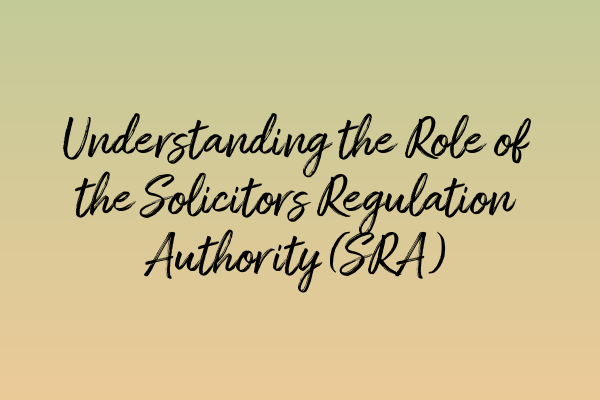Understanding the Role of the Solicitors Regulation Authority (SRA)
As a solicitor, it is crucial to understand the role and functions of the Solicitors Regulation Authority (SRA). The SRA is the independent regulatory body that oversees solicitors in England and Wales. Its main aim is to protect the interests of the public and maintain the integrity of the legal profession. In this blog post, we will delve deeper into the role of the SRA and its significance in the legal field.
The SRA has several responsibilities, which can be broadly categorized into three main areas: regulation, education, and enforcement. Let’s examine each of these areas in detail.
Regulation:
One of the primary roles of the SRA is to regulate solicitors and law firms. This means that the SRA sets the standards and rules that solicitors must adhere to in their professional practice. These rules cover various aspects, including client care, ethics, confidentiality, and professional conduct. By enforcing these standards, the SRA ensures that solicitors provide high-quality legal services to their clients.
The SRA also has the power to investigate and prosecute solicitors who breach these standards. This enforcement function is vital in maintaining public trust and confidence in the legal profession. By holding solicitors accountable for their actions, the SRA helps to maintain the reputation of the legal profession.
Education:
In addition to regulation and enforcement, the SRA plays a crucial role in education. The SRA sets the standards for legal education and training, including the qualification requirements for aspiring solicitors. This ensures that solicitors are equipped with the necessary knowledge and skills to provide competent legal advice and representation to their clients.
The SRA oversees the Solicitors Qualifying Examination (SQE), which is the new assessment framework for individuals seeking to qualify as solicitors. Through the SQE, the SRA aims to ensure that the solicitors of the future possess the necessary skills and competencies required for effective legal practice.
Enforcement:
The SRA has the power to take disciplinary action against solicitors who breach its regulations. This may include issuing a warning, imposing fines, or in severe cases, referring the matter to the Solicitors Disciplinary Tribunal (SDT). The SDT is an independent tribunal that has the authority to impose more substantial penalties, such as suspension or striking off from the Roll of Solicitors.
The SRA’s enforcement function is crucial in maintaining professional standards and protecting the interests of the public. By monitoring and addressing misconduct within the legal profession, the SRA ensures that solicitors uphold their duties and responsibilities to their clients and the wider society.
In conclusion, understanding the role of the Solicitors Regulation Authority (SRA) is essential for solicitors. The SRA’s regulatory, educational, and enforcement functions ensure that solicitors maintain high professional standards and uphold the integrity of the legal profession. By familiarizing themselves with the SRA’s rules and regulations, solicitors can provide the best possible legal services to their clients while ensuring compliance with legal and ethical standards.
To learn more about criminal law, SQE preparation, cross-examination techniques, private prosecutions, ethical challenges in criminal defense, and assault and battery laws, check out the related articles below:
– SQE Prep: Tips and Tricks to Excel in Criminal Law
– Cross-Examination Techniques: Mastering the Art of Questioning
– Private Prosecutions: Exploring Non-Governmental Prosecutions in Criminal Cases
– Ethical Challenges in Criminal Defence: Navigating Dilemmas
– Assault and Battery Laws: Understanding the Legal Parameters
By deepening your knowledge in these areas, you can enhance your understanding and expertise in the field of criminal law.


Leave a Reply